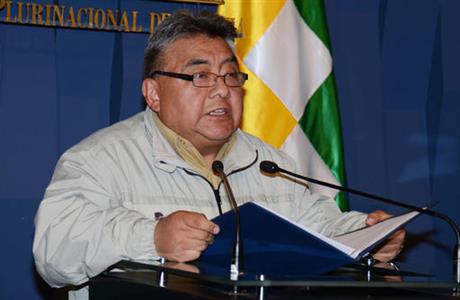
By CARLOS VALDEZ
Striking miners in Bolivia armed with dynamite seized highways in a protest over mining laws and then kidnapped, possibly tortured and beat to death the county’s deputy interior minister in a killing President Evo Morales characterized Friday as a “political conspiracy,” officials say.
Deputy Minister Rodolfo Llanes had traveled Thursday to the scene of the violent protests in western Bolivia in an effort to negotiate with the strikers.
Instead, Illanes was “savagely beaten” to death by miners, Defense Minister Reymi Ferreira told Red Uno television, his voice breaking.
Government Minister Carlos Romero called it a “cowardly and brutal killing” and asked that the body of Illanes, whose formal title is vice minister of the interior regime, be turned over to authorities.
by TaboolaMore from AP
Obama plans to create world’s largest marine protected area
Column: Olympic excellence now leads to whispers of cheating
Earlier, Romero had said that Illanes had been kidnapped and possibly tortured, but wasn’t able to confirm reports that he had been killed by the striking informal miners, who are demanding the right to associate with private companies, among other issues.
“This is a political conspiracy,” Morales said at a news conference on Friday. Calling for three days of official mourning, he criticized the “cowardly attitude” of the protesters and insisted that his government had “always been open” to negotiation.
The fatal beating came after the killings of two protesters in clashes with police, deaths that likely fueled the tensions.
Illanes had gone to Panduro, 80 miles (130 kilometers) south of the La Paz, to open a dialogue with the striking miners, who have blockaded a highway there since Monday. Thousands of passengers and vehicles are stranded on roads blocked by the strikers.
Officials say he was taken hostage by the miners on Thursday morning. At midday, Illanes said on his Twitter account: “My health is fine, my family can be calm.” There are reports that he had heart problems.
Bolivia’s informal or artisan miners number about 100,000 and work in self-managed cooperatives. They want to be able to associate with private companies, but are currently prohibited from doing so. The government argues that if they associate with multinational companies they will no longer be cooperatives.
The National Federation of Mining Cooperatives of Bolivia, strong allies of Morales when metal prices were high, was organized in the 1980s amid growing unemployment in the sector that followed the closure of state mines.
Federation members went on an indefinite protest after negotiations over the mining legislation failed.
Discuss this story on Twitter or Facebook



